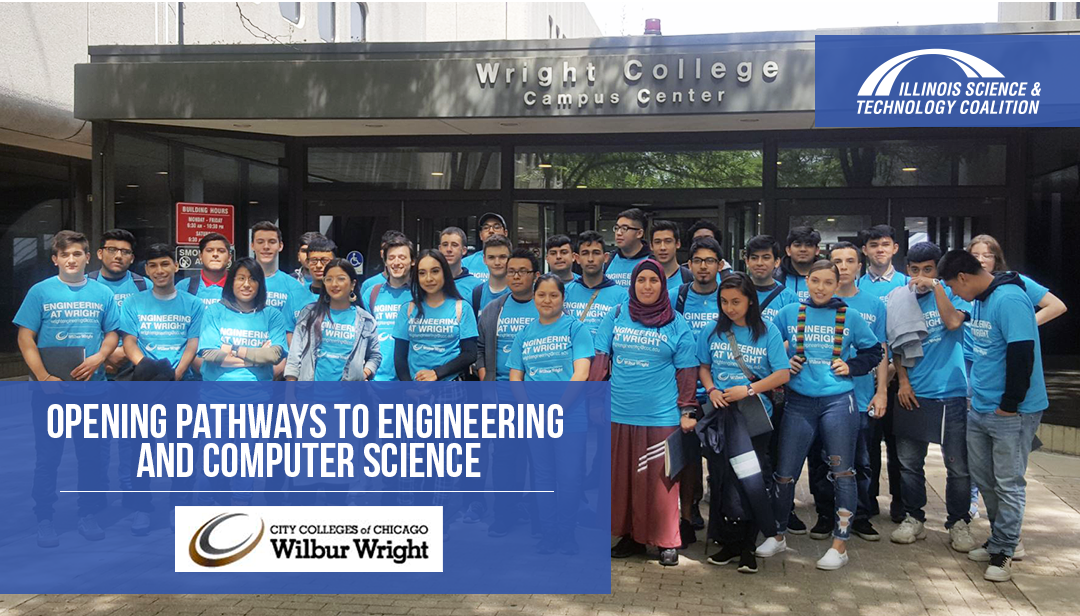Q&A WITh Doris Espiritu
Executive Director of Engineering and Professor of Chemistry,
City Colleges of Chicago-Wilbur Wright College
The City Colleges of Chicago (CCC) creates a critical talent pipeline for the city. The seven colleges that form the CCC system offer many students an accessible opportunity to enter STEM. Students have access to programs in advanced manufacturing, information technology, engineering, and computer science, among many others. After completion of a program, students either enter the job market or continue their education at a four-year university. The opportunity provided by CCC extends higher education in STEM to students of diverse socio-economic backgrounds that may not view enrollment in a four-year university after high school as an accessible option.
Wilbur Wright College on the city’s northwest side is providing its students with a unique pathway to engineering and computer science careers. Wright College’s Engineering Pathways program leverages existing partnerships between the college and in-state universities to prepare students for a bachelor’s degree in STEM. In this Catalyst Conversations, we sit down with Doris Espiritu, Executive Director of Engineering and Professor of Chemistry at City Colleges of Chicago-Wilbur Wright College, to talk about the success of Engineering Pathways—and how she is spearheading an expansion of the program.
Subscribe to get the Catalyst newsletter sent to your inbox.
Tell us about your background and how it prepared you for your current role at Wright.
By training, I am a chemist, physiologist, and biophysicist whose work has revolved around basic science research at R1 institutions. I’ve engineered proteins to understand kidney diseases, studied signaling pathways for obesity, and analyzed DNA sequences and toxin diversity using computer algorithms to develop drugs.
The work I do now is very distant from my academic background. However, the knowledge, skills, and analytical thinking I developed at R1 institutions are now instrumental for creating an ecosystem of excellence at the City Colleges of Chicago (CCC).
At Wright, what inspired you to lead Engineering Pathways? How does the program work?
I was immediately fascinated with the students’ diversity and hunger for knowledge at Wright College. As chair of the Physical Science department then, I worked to understand students’ needs and community college dynamics. In search of providing students more opportunities, I discovered the Engineering Pathways agreement between CCC and the College of Engineering at the University of Illinois at Urbana-Champaign (UIUC). Now as executive director of the program, I work to make sure every student has access to quality STEM education.
Engineering Pathways offers CCC students that complete the program guaranteed admission to The Grainger College of Engineering at UIUC. Taking advantage of this agreement, Wright College built a rigorous and programmatic Engineering Pathways program. The program is now in its sixth year, healthy and thriving.

Doris Espiritu, Executive Director Engineering and Professor of Chemistry, City Colleges of Chicago-Wilbur Wright College
You’ve also worked to expand access to Engineering Pathways. Tell us about that work.
In 2018, Wright College received a National Science Foundation (NSF): Hispanic Serving Institution (HSI) research grant (entitled “Building Bridges into Engineering and Computer Science”) expanding access to Engineering Pathways for students who might otherwise not be admitted. Through the grant, Wright College developed the Engineering Bridge Program to create an ecosystem of excellence built upon the pathway framework.
The Engineering Bridge Program provides motivated but underprepared students paid opportunities that prepare them for Engineering Pathways or other engineering track. The main goal of the program is to provide all students interested in engineering with affordable access to the highest quality programs in Illinois and the country—including guaranteed admission to The Grainger College of Engineering. The Engineering Bridge program prepares students to be college-ready, thereby increasing enrollment in Engineering Pathways, transfer to four-year institutions, and baccalaureate graduation.
It sounds like you’re not done growing these programs. What new partnerships is Wright working to create or expand?
In the first year of the Engineering Bridge project, Wright College was able to solidify new partnerships with The Armour College of Engineering at the Illinois Institute of Technology and with Southern Illinois University to provide students with additional options. While Wright College is currently using the Guaranteed Admissions Transfer (GAT) to the University of Illinois at Chicago, a conversation is ongoing to increase the intentionality of this partnership. The City Colleges of Chicago, through Wright College, will expand our partnerships with other 4-year institutions in the region to provide access and equitable education to all students in Chicago.

Jocelyn Collado, Engineering Pathways alum, senior in the Grainger College of Engineering at UIUC, President of Women in Computer Science at UIUC
What outcomes have you seen from these Pathways programs?
In 2015, Wright selectively admitted the first Engineering Pathways cohort, and 89% of the Fall 2015 cohort have either graduated or are on track to graduate with a bachelor’s degree. The unapologetic rigor of Wright College’s Engineering and Computer Science programs has resulted in students who not only survive at the four-year institutions, but thrive. Jocelyn Collado, a Fall 2016 cohort alumni, is currently a senior in the Grainger College of Engineering at UIUC. She is president of Women in Computer Science at UIUC, and has already interned at Argonne National Laboratories, Google, and Microsoft
In regards to the Engineering Pathways program at Wright College, Jocelyn says “I originally decided to attend the Engineering Pathways because I was not ready for a big transition. My experience ended up being a lot more than just a transition to college. Going in, I already had an idea of what I wanted to major in: Computer Science. But it was thanks to the class that Dr. Espritu put together that I was able to be certain that Computer Science was what I wanted to do for the rest of my life. I got exposure to a variety of majors, what they consisted of and what best fit my skills and interests. The fact that this program had guaranteed admission to UIUC tremendously helped with my enrollment, but it came with hard work as I had to keep a minimum GPA of 3.6. This program taught me a lot about leadership skills, time management and knowing when to ask for help, all of which have allowed me to have successful experience at UIUC.”
By providing affordable, supportive, and quality options for students in engineering and computer science, Wright College is positioned to increase diversity in engineering and computer science professions.
Subscribe
Subscribe to get the Catalyst newsletter sent to your inbox.

